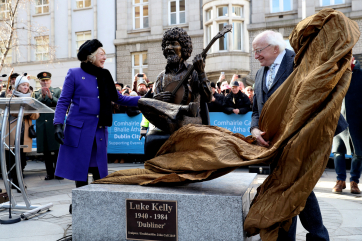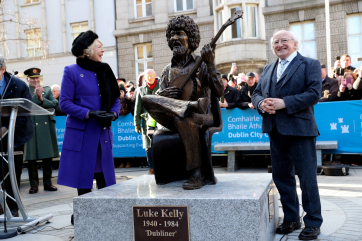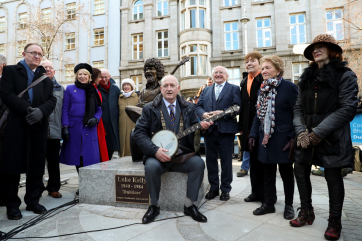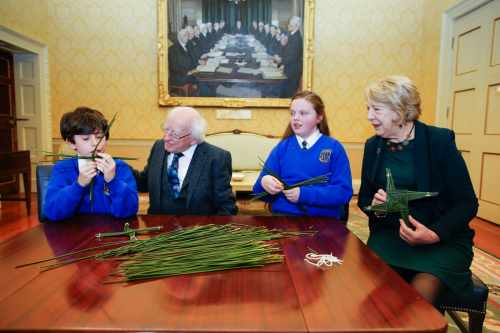Speech at the Unveiling of Statue of Luke Kelly
Guild Street, Dublin, 30 January 2019
Tá áthas orm páirt a ghlacadh libh san ócáid seo inniu agus an dealbh seo atá tiomnaithe i gcuimhne ar Luke Kelly á nochtadh. Is léir ón méid agaibh a tháinig chuig an ócáid seo an meas atá i measc an phobail ar fhear a rinne an oiread sin chun cáil ceoil na hÉireann a chur chun cinn, agus a leanfaidh a h-oidhreacht ar aghaidh ag spreagadh glúnta nua de cheoltóirí Éireannacha.
[I am delighted to join you all here today for the unveiling of this statue dedicated to the memory of Luke Kelly. That so many of you have taken the time to come here today is a great testament to a man who gave so much to enhance Ireland’s musical reputation and whose legacy will continue to inspire new generations of Irish musicians.]
One of Luke Kelly and the Dubliners’ best loved songs was ‘The Town I loved so Well’. Although the town of the song was, of course, Derry, the passion with which Luke sang it evoked his own great love for the city of his birth.
It is greatly fitting, therefore, that this statue will stand here in Guild Street in memory of a man whose musical talent was first awoken on the streets of the working-class Dublin where he grew up, and which was to become the creative landscape that drove so much of his work.
Luke had great affection for the people of Dublin, an affection that was returned by the many fans who gathered in places like O’Donoghue’s Pub to hear him sing the reimagined and reworked ballads which so defined his musical career.
Today, thirty-five years after his death, his great legacy continues to inspire new generations of Irish musicians as they continue to enthral audiences at home and across the globe. The pitch and rhythm of Luke’s unique voice finds its echo in the singing of artists such as Christy Moore, Damien Dempsey, Sinéad O’Connor and so many more who ensure that the boundaries of Irish music continue to be pushed outwards while remaining rooted in the tradition from which it grew and flourished.
Luke’s singular ability to take that traditional music, so strongly entwined in our Irish culture and heritage, and to recraft and rework it, imbuing it with a passion and great empathy inspired a new generation to engage with this rich part of their past. We owe, indeed, a great debt of gratitude to Luke Kelly and the Dubliners for that renewed interest in our traditional Irish ballads which has ensured they continue to live on in a rapidly changing Ireland.
I am grateful to have been introduced to him by Sabina who was an actor in the Focus Theatre working with the incredibly talented Deirdre O Connell. Luke was a uniquely talented musician and a great wordsmith and it is so uplifting to be here and to witness this most deserved tribute to a man who played such a critical role in the musical journey of our nation, helping to enable its continued progression, its constant reworking and re-shaping and its ongoing reflection of the society with which it engages.
On Luke’s grave are engraved the simple words ‘Luke Kelly – Dubliner’. Luke’s influence, however, as man and musician stretched far beyond the landscape of this town he loved so well.
For those of us who knew Luke we remember him, of course, not only as a gifted and innovative musician but also as a man with a great social conscience who raised his voice in pursuit of a fairer and more just world. Luke was a great socialist who fought for human rights in all its forms, protesting against apartheid, discrimination and segregation and generously throwing himself into many important battles against injustice and inequality. He was a man who could move seamlessly from the world of song and music, to the world of poetry and theatre, to the world of politics, in its best sense.
Indeed, that sense of compassion and ability to identify with ‘the Other’ strongly defined not only how Luke lived his life but also the musical legacy that he has left the world.
When we listen to Luke’s rendition of songs such as Raglan Road, Scorn Not His Simplicity, and The Night Visiting Song we remain moved by the visceral quality that he brings to them, a quality that makes Luke’s version of these songs the classic one, the standard that his successors strive to reach.
Luke has contributed profoundly to Ireland’s cultural life, a contribution that is now permanently stitched into our rich heritage. This statue will stand as a permanent tribute to a man who has gifted us with such a profound legacy. Vera Klute, who has crafted this magnificent sculpture, has said she sought to reflect the ‘raw intimate response’ that Luke inspired in his listeners. To achieve this she has focused solely on Luke’s face, capturing the emotion, energy and sheer strength of feeling that those of us who knew Luke can immediately recognise.
I congratulate Vera on this beautiful piece of art which stands as such a fitting and moving memory of Luke the man and Luke the artist.
I also thank Dublin City Council, in particular City Arts Officer Ray Yeates, the Luke Kelly Working Group chaired by Cllr Áine Clancy, Dublin Port Company and Eamonn O’Reilly, and all of the fabricators and others who worked on the sculptures.
Like so many of you, Sabina and I were proud to call ourselves friends of Luke Kelly, and to have had our lives enriched by his genius, his generosity, his good humour and his great sense of shared humanity.
Is mór an onóir agus an phléisiúir é a bheith anseo inniu chun cuimhneamh ar an gceoltóir cumasach, a raibh ina laochra ar son cearta an duine, agus a raibh ina chara cineálta agus dílis; Luke Kelly.
[It is a great honour and pleasure to be here today to remember the supremely talented musician, compassionate champion of human rights, and kind and loyal friend that was Luke Kelly.]
Go raibh míle maith agaibh go léir.




